新课标高中英语必修二unit2学案
高中英语人教新课标必修二unit 2(2)Grammar学案设计
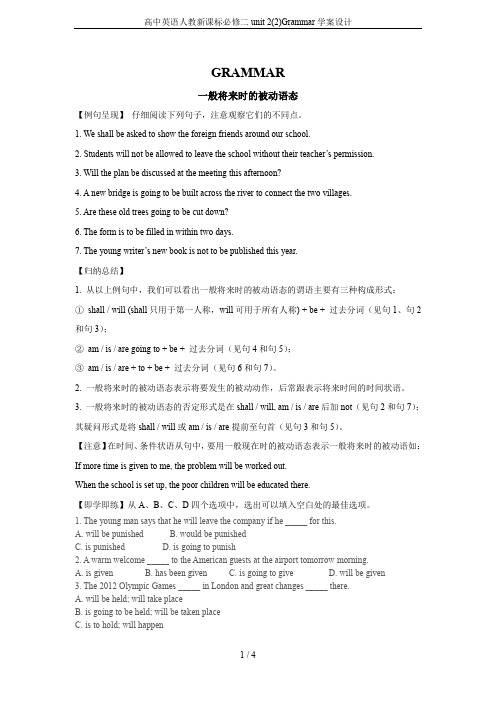
GRAMMAR一般将来时的被动语态【例句呈现】仔细阅读下列句子,注意观察它们的不同点。
1. We shall be asked to show the foreign friends around our school.2. Students will not be allowed to leave the school without their teacher’s permission.3. Will the plan be discussed at the meeting this afternoon?4. A new bridge is going to be built across the river to connect the two villages.5. Are these old trees going to be cut down?6. The form is to be filled in within two days.7. The young writer’s new book is not to be published this year.【归纳总结】1. 从以上例句中,我们可以看出一般将来时的被动语态的谓语主要有三种构成形式:①shall / will (shall只用于第一人称,will可用于所有人称) + be + 过去分词(见句1、句2和句3);②am / is / are going to + be + 过去分词(见句4和句5);③am / is / are + to + be + 过去分词(见句6和句7)。
2. 一般将来时的被动语态表示将要发生的被动动作,后常跟表示将来时间的时间状语。
3. 一般将来时的被动语态的否定形式是在shall / will, am / is / are后加not(见句2和句7);其疑问形式是将shall / will或am / is / are提前至句首(见句3和句5)。
新课标高中英语必修二全册教案必修2教案

新课标高中英语必修二全册教案必修2教案介绍本教案是针对新课标高中英语必修二全册的教学内容而设计的。
必修二教案旨在帮助学生更好地理解和掌握相关的英语知识和技能。
通过本教案,学生将能够提高听、说、读、写和翻译等英语技能,同时也能够拓宽他们的英语词汇量和语法知识。
教学目标- 提高学生的听力理解能力,使其能够正确听懂和理解与课本内容相关的英语对话和文章。
- 培养学生的口语表达能力,使其能够用流利和准确的英语进行简单的对话和交流。
- 培养学生的阅读理解能力,使其能够读懂并理解课本中的英语文章和故事。
- 帮助学生提高写作能力,使其能够用英语书写简单的句子、段落和文章。
- 锻炼学生的翻译能力,使其能够将中文翻译成英文和将英文翻译成中文。
教学内容本教案涵盖了必修二全册的所有课程内容,包括但不限于以下主题:- Unit 1: Cultural Relics- Unit 2: The Olympics- Unit 3: Life in the Future- Unit 4: Earthquakes- Unit 5: Nelson Mandela- Unit 6: Life in the Future教学方法为了达到上述教学目标,我们将采用以下教学方法:- 听力训练:通过让学生听录音和对话来提高他们的听力理解能力。
- 口语练:通过角色扮演和对话活动来培养学生的口语表达能力。
- 阅读训练:通过阅读课本中的文章和故事来提高学生的阅读理解能力。
- 写作练:通过写作任务和练来帮助学生提高写作能力。
- 翻译训练:通过翻译练来锻炼学生的翻译能力。
教学评估为了评估学生的研究效果和对教学内容的掌握程度,我们将采用以下评估方式:- 听力测试:通过听力测试来评估学生的听力理解能力。
- 口语表达:通过口语表达任务和对话活动来评估学生的口语表达能力。
- 阅读理解:通过阅读理解任务和测试来评估学生的阅读理解能力。
- 写作评估:通过作文和写作练来评估学生的写作能力。
英语必修2Unit 2学案:Reading and Thinking

Reading and ThinkingⅠ.单词拼写1.poster n.海报2.species n. 物种3.shark n. 鲨鱼4.fin n. (鱼的)鳍5.mass adj. 大量的;广泛的n. 大量;堆;群6.habitat n. (动植物的)生活环境;栖息地7.aware adj. 知道;发觉;有……意识的8.endanger v t. 使遭受危险;危害9.average n. 平均数;平均水平adj. 平均的;正常的;普通的10.prince n. 王子;王孙;亲王11.living adj. 居住的;活的;在用的n. 生活;生计12.adapt v i. 适应v t. 使适应;使适合13.measure n. 措施;方法v t. 测量;度量;估量14.authority n. 官方;当权;权威15.pressure n. 压力;要求16.reserve n. (动植物)保护区;储存(量)v t. 预定;预留;保留17.plain n. 平原adj. 简单明了的;直率的;平凡的18.herd n. 牧群;兽群19.observe v t. 观察(到);注视;遵守20.beauty n. 美;美人;美好的东西21.remind v t. 提醒;使想起22.fur n. 毛(皮);毛皮衣服23.sacred adj. 神圣的;受尊敬的24.shoot v i.& v t. 射杀;射伤;发射25.profit n. 利润;利益26.goods n. 商品;货物27.attack n.& v i.& v t. 攻击;抨击28.remove v t. 去除;移开;脱去29.intend v i.& v t. 打算;计划;想要30.harmony n. 和谐;融洽31.creature n. 生物;动物Ⅱ.词汇转换1.illegal adj.不合法的;非法的→illegally ad v.不合法地;非法地2.hunt v i.& v t.打猎;搜寻;追捕→hunter n.猎人3.immediately ad v.立刻→immediate adj.立即的;直接的4.alarming adj.惊人的;使人害怕的→alarm v t.使惊恐;使害怕;使担心n.惊恐;警报;报警器5.rate n.速度;(比)率v t.划分等级→rating n.等级;级别6.extinct adj.已灭绝的→extinction n.灭绝7.concern v t.涉及;让……担忧→concerned adj.担心的;关切的8.effective adj.有效的;生效的→effect n.效果;影响9.recover v i.恢复;康复v t.找回;寻回→recovery n.恢复;复苏;康复10.threat n.威胁→threaten v t.威胁;危及11.exist v i.存在;生存→existence n.存在;生存Ⅲ.默写短语1.on__earth (放在疑问词之后表示强调)究竟;到底2.die__out 灭亡;逐渐消失3.aware__of 意识到;知道4.on__average 平均5.make__progress 取得进步6.concerned__about 对……关切的;为……担忧的7.adapt__to 适应8.under__pressure 在压力下;承受压力9.make__out 看清;听清;分清10.remind__sb__of__sb/sth 使某人想起(类似的人或事) 11.watch__over 保护;照管;监督12.day__and__night 日日夜夜;夜以继日课文注解①snow-covered adj.被雪覆盖的②disappear into消失在……中③plain/pleIn/ n.平原adj.简单明了的;直率的;平凡的on the plain在平原上④make out看清;听清;分清⑤herd/hɜːd/ n.牧群;兽群a herd of cattle一群牛herds of elephants数群大象⑥observe/əb'zɜːv/ v t.观察(到);注视;遵守observe sb do sth观察某人做某事observe sb doing sth观察某人正在做某事⑦beauty/'bjuːti/ n.美;美人;美好的东西⎩⎪⎨⎪⎧beauty 美,美丽(不可数名词)a beauty 美人,美丽的东西(可数 名词,抽象名词具体化) ⑧remind/rI 'maInd/ v t .提醒;使想起remind sb of sb/sth 使某人想起(类似的人或物) remind sb to do sth 提醒某人做某事 ⑨fur/f ɜː/ n .毛(皮);毛皮衣服 ⑩shelter n .庇护;掩蔽,遮蔽 ⑪sacred/'seIkrId/ adj .神圣的;受尊敬的 易混:scared adj .害怕的,恐惧的 ⑫try to do sth 尽量做某事 try doing sth 试着做某事 ⑬drop by 下降了(表示幅度) drop to 下降到(表示结果)⑭shoot/ʃu ːt/ v t .& v i .(shot ,shot)射杀;射伤;发射 ⑮profit/'pr ɒfIt/ n .利润;利益 make a profit/profits 盈利⑯save...from 从……中救出,使免受⑰place sth under protection 将……置于保护之下 ⑱watch over 保护;照管;监督“照顾,照看”的其他表达法:take care of ,look after ,care for ⑲day and night 日日夜夜;夜以继日 ⑳attack/ə't æk/ n .,v i .& v t .攻击;抨击under attack受到攻击○21let sb/sth do sth让某人/某物做某事○22effective/I'fektIv/ adj.有效的;生效的effect n.影响,效果,作用○23recover/rI'kʌvə(r)/ v i.恢复;康复v t.找回;寻回○24remove/rI'muːv/ v t.去除;移开;脱去remove...from...从……移走……○25intend/In'tend/ v i.& v t.打算;计划;想要intend to do sth=be intended to do sth打算做某事○26threat/θret/ n.威胁the threats to...对……的威胁threaten/'θretn/ v t.威胁;危及○27think about考虑○28exist/Iɡ'zIst/ v i.存在;生存exist in存在于……中exist on(=live on)靠……生存There exist(s)...有……;存在……existence n.存在;生存○29harmony/'hɑːməni/ n.和谐;融洽in harmony with与……协调/一致原文呈现A DAY IN THE CLOUDSThe air is thin and we have to rest several times on the short hike from camp.To ourleft,snow-covered① mountains disappear into② clouds that seem almost close enough to touch〖1〗.On the plain③ in front of us,we can just make out④ a herd⑤ of graceful animals.This is why〖2〗we’re here—to observe⑥ Tibetan antelopes〖3〗.〖1〗that引导定语从句,修饰clouds,关系词在从句中作主语。
人教新课标高中英语必修二Unit2TheOlympicGames导学案(2)
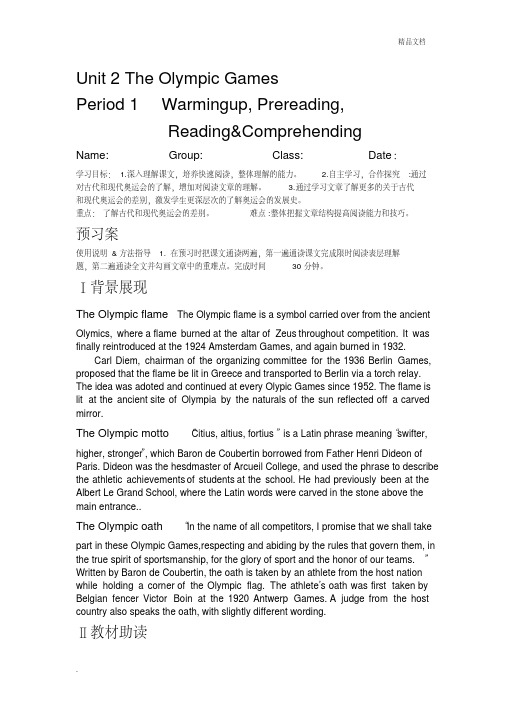
B. He was a volunteer for the 2008 Olympics. C. He was a famous writer about 2000 years ago.
D. He was a Greek editor.
2. Why did Pausanias interview Li Yan?
the Summer Olympics. Only
who have reached the agreed
standard for their event will be
as competitors. They may come
from
in the world. There are over 250sports and each one has
精品文档
Unit 2 The Olympic Games
Period 1 Warmingup, Prereading,
Reading&Comprehending
Name:
Group:
Class:
Date :
学习目标: 1.深入理解课文,培养快速阅读,整体理解的能力。
2.自主学习,合作探究 :通过
对古代和现代奥运会的了解,增加对阅读文章的理解。
The Olympic motto “Citius, altius, fortius ”is a Latin phrase meaning“swifter,
higher, stronger”, which Baron de Coubertin borrowed from Father Henri Dideon of Paris. Dideon was the hesdmaster of Arcueil College, and used the phrase to describe the athletic achievements of students at the school. He had previously been at the Albert Le Grand School, where the Latin words were carved in the stone above the main entrance..
高中英语人教新课标必修二Unit2 语言点课 教学设计
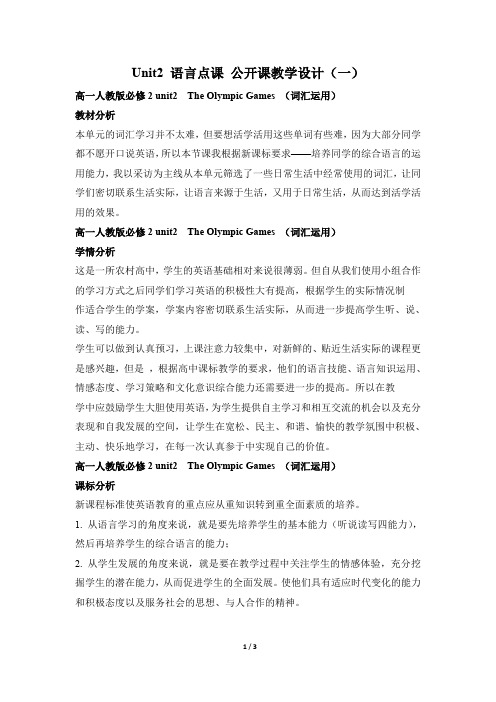
Unit2 语言点课公开课教学设计(一)高一人教版必修2 unit2 The Olympic Games (词汇运用)教材分析本单元的词汇学习并不太难,但要想活学活用这些单词有些难,因为大部分同学都不愿开口说英语,所以本节课我根据新课标要求——培养同学的综合语言的运用能力,我以采访为主线从本单元筛选了一些日常生活中经常使用的词汇,让同学们密切联系生活实际,让语言来源于生活,又用于日常生活,从而达到活学活用的效果。
高一人教版必修2 unit2 The Olympic Games (词汇运用)学情分析这是一所农村高中,学生的英语基础相对来说很薄弱。
但自从我们使用小组合作的学习方式之后同学们学习英语的积极性大有提高,根据学生的实际情况制作适合学生的学案,学案内容密切联系生活实际,从而进一步提高学生听、说、读、写的能力。
学生可以做到认真预习,上课注意力较集中,对新鲜的、贴近生活实际的课程更是感兴趣,但是,根据高中课标教学的要求,他们的语言技能、语言知识运用、情感态度、学习策略和文化意识综合能力还需要进一步的提高。
所以在教学中应鼓励学生大胆使用英语,为学生提供自主学习和相互交流的机会以及充分表现和自我发展的空间,让学生在宽松、民主、和谐、愉快的教学氛围中积极、主动、快乐地学习,在每一次认真参于中实现自己的价值。
高一人教版必修2 unit2 The Olympic Games (词汇运用)课标分析新课程标准使英语教育的重点应从重知识转到重全面素质的培养。
1. 从语言学习的角度来说,就是要先培养学生的基本能力(听说读写四能力),然后再培养学生的综合语言的能力;2. 从学生发展的角度来说,就是要在教学过程中关注学生的情感体验,充分挖掘学生的潜在能力,从而促进学生的全面发展。
使他们具有适应时代变化的能力和积极态度以及服务社会的思想、与人合作的精神。
高一人教版必修2 unit2 The Olympic Games (词汇运用)教学设计Step I:class report (课前演讲)(Topic(今日话题):--The importance of breakfast 早餐的重要性!--Today ,I am an interviewer! 今天我来当记者!通过每次的课前三分钟锻炼学生的英语表达。
人教新课标高一英语必修二第2单元教案
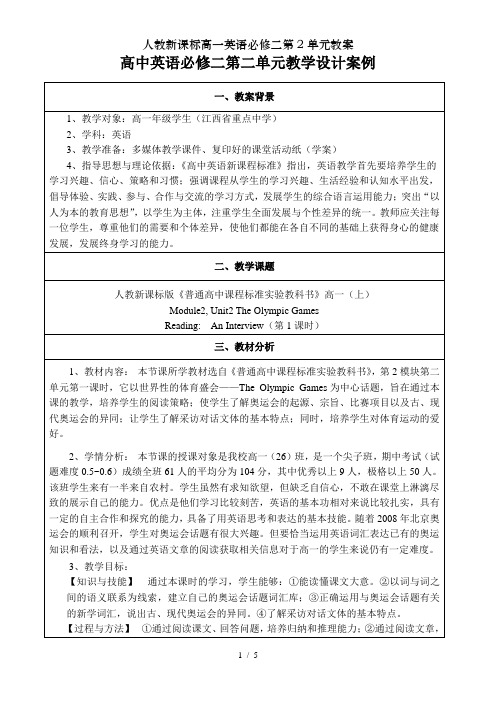
1、以任务型教学为理念,强调教学方法的灵活性和多样性。
2、采用 5P 教学法(即 preparation, presentation, practice, production, progress),学生通过 自学、讨论、交流、询问、演练等各种形式来学习并掌握语言,从而使语言的学习富有成 效。
教学活动 Activities
(Preparation) Warming up and Pre-reading
2/5
Байду номын сангаас
设计意图 Intentions
互动模式 &时间
IP & time
人教新课标1. A quiz: Ss discuss to answer the
曲导入。
3'
Step 1
questions about the Olympic Games. 引导学生通过回答问卷,激活学
生已有的背景知识,使学生积极
主动地参与本单元中心话题的
GW
2. Check the answers.
思考与讨论。
1'
1. Ss descib教学课题
人教新课标版《普通高中课程标准实验教科书》高一(上) Module2, Unit2 The Olympic Games Reading: An Interview(第 1 课时)
三、教材分析
1、教材内容: 本节课所学教材选自《普通高中课程标准实验教科书》,第 2 模块第二 单元第一课时,它以世界性的体育盛会——The Olympic Games 为中心话题,旨在通过本 课的教学,培养学生的阅读策略;使学生了解奥运会的起源、宗旨、比赛项目以及古、现 代奥运会的异同;让学生了解采访对话文体的基本特点;同时,培养学生对体育运动的爱 好。
最新人教新课标高一英语必修二第2单元教案

精品文档高中英语必修二第二单元教学设计案例一、教案背景1、教学对象:高一年级学生(江西省重点中学)2、学科:英语3、教学准备:多媒体教学课件、复印好的课堂活动纸(学案)4、指导思想与理论依据:《高中英语新课程标准》指出,英语教学首先要培养学生的学习兴趣、信心、策略和习惯;强调课程从学生的学习兴趣、生活经验和认知水平出发,倡导体验、实践、参与、合作与交流的学习方式,发展学生的综合语言运用能力;突出“以人为本的教育思想”,以学生为主体,注重学生全面发展与个性差异的统一。
教师应关注每一位学生,尊重他们的需要和个体差异,使他们都能在各自不同的基础上获得身心的健康发展,发展终身学习的能力。
二、教学课题人教新课标版《普通高中课程标准实验教科书》高一(上)Module2,Unit2The Olympic GamesReading:An Interview(第1课时)三、教材分析1、教材内容:本节课所学教材选自《普通高中课程标准实验教科书》,第2模块第二单元第一课时,它以世界性的体育盛会——The Olympic Games为中心话题,旨在通过本课的教学,培养学生的阅读策略;使学生了解奥运会的起源、宗旨、比赛项目以及古、现代奥运会的异同;让学生了解采访对话文体的基本特点;同时,培养学生对体育运动的爱好。
2、学情分析:本节课的授课对象是我校高一(26)班,是一个尖子班,期中考试(试题难度0.5~0.6)成绩全班61人的平均分为104分,其中优秀以上9人,极格以上50人。
该班学生来有一半来自农村。
学生虽然有求知欲望,但缺乏自信心,不敢在课堂上淋漓尽致的展示自己的能力。
优点是他们学习比较刻苦,英语的基本功相对来说比较扎实,具有一定的自主合作和探究的能力,具备了用英语思考和表达的基本技能。
随着2008年北京奥运会的顺利召开,学生对奥运会话题有很大兴趣。
但要恰当运用英语词汇表达已有的奥运知识和看法,以及通过英语文章的阅读获取相关信息对于高一的学生来说仍有一定难度。
人教英语新课标必修2全册精品教案(Unit 2 The Olympic Games)
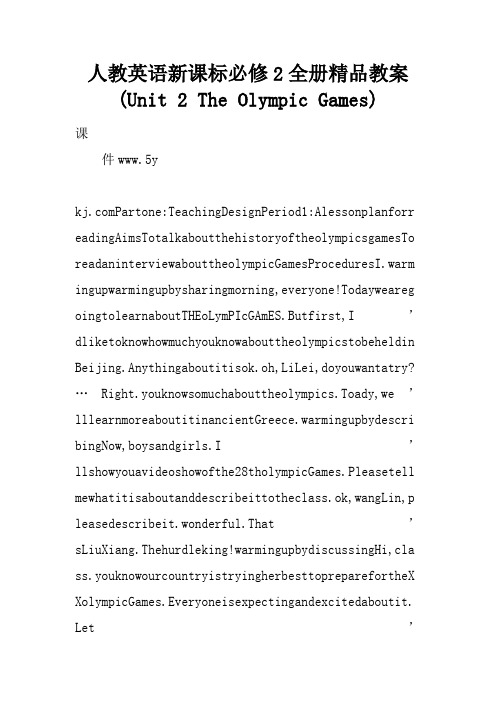
人教英语新课标必修2全册精品教案(Unit 2 The Olympic Games)课件www.5yPartone:TeachingDesignPeriod1:Alessonplanforr eadingAimsTotalkaboutthehistoryoftheolympicsgamesTo readaninterviewabouttheolympicGamesProceduresI.warm ingupwarmingupbysharingmorning,everyone!Todayweareg oingtolearnaboutTHEoLymPIcGAmES.Butfirst,I’dliketoknowhowmuchyouknowabouttheolympicstobeheldin Beijing.Anythingaboutitisok.oh,LiLei,doyouwantatry?…Right.youknowsomuchabouttheolympics.Toady,we’lllearnmoreaboutitinancientGreece.warmingupbydescri bingNow,boysandgirls.I’llshowyouavideoshowofthe28tholympicGames.Pleasetell mewhatitisaboutanddescribeittotheclass.ok,wangLin,p leasedescribeit.wonderful.That’sLiuXiang.Thehurdleking!warmingupbydiscussingHi,cla ss.youknowourcountryistryingherbesttopreparefortheX XolympicGames.Everyoneisexpectingandexcitedaboutit. Let’sdiscusswhatwecandoforit.Andimaginewhatwewilldoatth eXXolympics.II.Pre-reading1.AskingandansweringNow,p leasereadthethreequestionsbeforetheReading.Let’sdoitinturn.Let’sbeginfromthefirstrowhere…ok,youdidagoodjob.Let’ssummarizeyouranswers.Forreference:1.InSummerolympi cs,therearerunning,swimming,shooting,wrestling,jump ing,football,basketball,volleyball,tabletennis,thro wing,javelin,weightlifting,gymnastics,boxingetc.Inw interolympics,thereareskiingskating,icehockey,skiju mping,sledding,snowboardingetc.2.The29tholympicGame swillbeheldinBeijingonAuguster18th,XX.3.Toholdtheol ympicGamesisarichprizeforacountry.Anditcanmakeacoun tryknownintheworld.Itcanstimulatethecountry’seconomy,andhelptospeedupitsdevelopment.2.Imagingan dintroducingPleaselookatthethreepicturesinthereadin g.Pleasetalkaboutthem.Imaginewhateveryoucan.Forrefe rence:ThefirstpictureisthestatusofagreatGreek.Hisna meisPausanias.Hewasafamoustravelerandwriterinthesec ondcenturyAD.HisGuidetoGreeceisanextremelycomprehen siveguidebookfortourists,concentratingonbuildings,t ombsandstatusandincludingalotofinformationonthemythological,religiousandhistoricalbackgroundtothemonum entsdescribed.Itissoinformativethatitmaybecalledthe foundationofclassicalarchaeologyandthisancientBaede kerisstillusedasaguidetoclassicalGreece.canyouremem berafamousancientchinesetravelerandwriter?Healsowro teabook.yes,hisnameisXuShake.HisworksisTheNotesofXu Shake’stravels.Thesecondpictureistheopeningceremonyoftheo lympicGames.maybethisistheprinciplestadium.It’slargeandcanholdthousandsofaudience.Thethirdpicture isachineseathletenamedyangyang.Shewonagoldmedalforc hinaintheXXwinterolympicGames.Sheisafamousskatingpl ayer.3.TalkingandSharingweknowtherearemanydifferenc esandsimilaritiesabouttheancientandmodernolympics.D oyouknowanythingaboutthem?youcansimplyguess.yes,Luc y,try…III.Reading1.Readingaloudtotherecordingandfindingth egeneralideaNowpleaselistenandreadaloudtotherecordi ngofthetextANINTERVIEw.Payattentiontothepronunciati onandintonationaswellasthepauseswithineachsentence. Thentrytogetthegeneralideaofthepassage.Haveyougotth emainidea?yes,ittellsusthedifferencesandthesimilaritiesbetweentheancientandmodernolympics.2.Readingand actingNowlet’splaythepartsoftheGreekwriterPausaniasandthechinese girlLiLi.Nowboys,youarePausanias;girls,youareLiLi.P leasepayattentiontotheboldwords.3.Readingandfinding Nowreadthetextagain.Theboysshalltrytofinishthetask: whatwastheancientolympicslike?Thegirlsshalltrytofin ishthetask:whatisthemodernolympicslike?4.Readingand collectinginformationok,nowlet’sreaditsilently.Firstlet’stalkaboutthesamepointsbetweentheancientandmodernol ympics.whocananswer?Anyvolunteers?Thenlet’scometothedifferences.Thesimilarities①Bothareheldeveryfouryears.②Bothareheldnotformoneybutforhonour.③Thebeliefsarethesame.Theyare:Swifter,Higher,andstro nger.④menareallowedtotakepartbothinancientandmodernolympi cs.⑤Someeventsarethesame,suchasrunning,jumping,shooting andthowing.TheDifferences①Therewerenotwinterolympicsinthepast.②Nowcompetitorsarefromallovertheworld.Butintheancien ttime,onlythepeopleinGreececouldtakepart.③onlymenwereallowedtotakepartinthepast,nowwomanareal soallowed.④Inthepast,winnersgottheolivewreathastheprize.Nowcom petitorscompeteformedals.⑤Theeventsandathletesinmoderntimearemorethanthoseint hepast.⑥Thereisaspecialvillageforthecompetitorstolivein,ast adiumforcompetitions,agymnasiumforthesewhowatchtheg amesnow.Buttherewerenotinthepast.)5.Readingandunder liningNextyouaretoreadandunderlinealltheusefulexpre ssionsorcollocationsinthepassage.copythemtoyournotebookafterclassashomework.collocationsfromANINTERVIE wtakepartin…,goldmedals,thespiritof…,beheld,inord erto,hosttheolympicGames,onamagicaljourney,findout, thepresentdayolympicGames,usedto,writeabout…,comet oyourtime,beadmittedas…,twosetsof…,enjoycompeting in…,competeagainst…,forthehonourof…,reachthestan dard,beadmittedto…,playaveryimportantrole,aswellas ,astadiumforcompetitions,asamatteroffact,competefor …,olivewreath,feelproudof…,make…happyⅣclosingdownclosingdownbydoingexerciseToendthelesson youaretodothecomprehendingexercises1&2.closingd ownbydiscussingyouknowourgovernmenthastrieditsbestt ocompeteforhostingthe29tholympicGames.Ithascostalot ofmoney.Doyouthinkitisworthwhile?why?Forreference:I tisworthwhiletohosttheolympicGames.TohostolympicGam escanmakeourcountryknowntothewholeworld.Tohostolymp icGamescanmakeourcultureandpeopleunderstoodbytheoth erpeoples.TohostolympicGamescanstimulatethedevelopi ngofoureconomy.closingbyimaginingImaginewhatwewilld oandwhatwecandoforthe29tholympicGamesnow.Forreferen ce:maybewecanserveasvolunteerstohelptheforeignvisit orsandathletesfromallovertheworld.Soatpresentweshouldstudyhard.EspeciallyweshouldtryourbesttolearnEngl ishwell.closingdownbynarratingwecanseethetextiswrit teninaconversationalstyle.Andtherearetwospeakers.on eisPausanias,aGreekwriterXXyearsago,theotherisLiLi, achinesegirl.Nowlet’schangeitintoanarrativestyle.Inotherwords,let’sdescribetheancientandmodernolympicGamesinourownwor ds.whowouldliketohaveatry?Forreference:Theancientol ympicGamesbeganinGreeceandwereheldfrom776B.c.toA.D. 393.Itwasheldeveryfouryears.Atthattime,therewerenot somanysportsastoday.Andwomenwerenotallowedtotakepar tinthegames.Therewerenotwinterolympicsatthattime.wi nnersgottheolivewreathastheprize.Themottowasswifter ,higherandstronger.ThemodernolympicGamesbeganin1891 .They’reheldeveryfouryears.Therearemanynewsportsintheolym pics.Inthesummerolympicsthereareover250differentspo rts.womenarenotonlyallowedtojoininbutalsoplayaveryi mportantrole.Nowthecompetitorscompeteformedals.Them ottoisswifter,higherandstronger.closingdownbysummar izingAswehavefinishedthepassagewe’llsumupwhatwehavelearned.Firstlet’sseethewritingskills.Itiswritteninaconversationalst yle.It’sinaveryinterestingway.ItadoptsadialoguebetweenPaus aniaswholivedXXyearsagoandachinesegirdinmodernworld .Throughtheirdialogue,thedifferencesandsimilarities betweentheancientandmodernolympicGamesaremadeknownt othereaders.justbecauseitisinaconversationalstyle,t herearequiteafeworalspokenEnglishandellipticalphras es.Throughthecomparisonbetweentheancientandmodernol ympicGames,wehavelearnedthedifferencesandthesimilar itiesbetweenthem.Nowwecanhaveadeepunderstandingofth eGames.Fromthepassage,wecanhaveadeepunderstandingof theGames.Fromthepassage,wecanalsogettoknowthattheol ympicGamesaredevelopingandimproving.It’sourdutytomaketheolympicGamesbetterandhealthier.wek nowthatoneoftheslogansforXXBeijingolympicGamesisGre enolympicGames.Itshowsthatpeoplearepayingmoreandmor eattentiontoourenvironment.Period2:AlessonplanforLe arningaboutLanguageAims:TolearnaboutfuturepassivevoiceTodiscoverusefulwords andexpressionsTolearnthemethodsofwordsformationProc eduresI.warmingupwarmingupbydictatingThereareseveralimportantsentencesinthisunit.Let’sdictatethem.Ifyoucan’t,learnthembyheartafterclass.①whenandwherewillthenextolympicGamesbeheld?②Iliveinwhatyoucall“AncientGreece”and/usedtowriteabouttheolympicGamesmorethanXXyearsa go.③Allcountriescantakepartiftheyreachthestandardtobead mittedtothegames.④ThenextolympicGameswillbeheldinmyhometown.⑤Itisjustasmuchacompetitionamongcountriestohosttheol ympicsastowinanolympicmedal.warmingupbydiscoveringu sefulwordsandexpressionsTurntopage11anddoexercises1 ,2,3and5first.checkyouranswersagainstyourclassmates ’.II.Learningaboutwordformation1.Doexercise4anddis covertherules.Turntopage12andfindouttherulesofwordf ormation.Byadding-ingtoaverb,wecanchangetheverbinto anoun.Thatmeanswecanchange“doingsomesport”into “thenameofthesport”.Byadding-ertoaverb,wecanchang etheverbintoanoun.Thatmeanswecanchange“doingsomesport”into “thepersonwhodoesthesport”.2.meansofword-formatio ningeneralAffixation,conversion,andcompositionareth echiefmeansofword-formationinEnglish.Besidesthese,t herearealsootherminorwaysofword-formationincludingc lipping,acronymy,blendingetc.III.LearningaboutPrese ntFuturePassiveVoiceTurntopage13anddoexercise3.Andt elltheclasstheformationofpresentfuturepassivevoice. Forreference:welldone,class.wecanfollowthefollowing formlationtoturnthefuturetensesintofuturepassivevoi ce;begoingtobedone,beabouttobedone,betobedone,will/ shallbedone,would/shouldbedone.Ⅳclosingdownbysummarizing1.Presentfuturepassivevoice AffirmativeNegativeInterrogativeIyouHe/she/itwill beaskedwewillyou/TheywillIyouHe/she/itwillnotbeaskedwewillnotyou/TheywillnotwillIwillyouwillhe/s he/itbeaskedwillwewillyou/they2.ThepassiveVoiceofphrasal verbGenerallyspeaking,onlytransitiveverbscanformthe passivevoice,foronlytransitiveverbscanbefollowedbyobjects.Butmanyintransitiveverbstogetherwithsomeprep ositionsandadverbscanbeusedastransitiveverbs.Sothey canalsobefollowedbytheobjects.Thereforetheycanalsob eusedinpassivevoice.Butnotethatallthephrasalverbsar eusedasawhole.whenusingtheminpassivevoice,wecannotd ropouttheprepositionsandadverbs.Forexamples:Atlastt heyputoutthefire.Atlastthefirewasputout.Theywillputupanoticeonthewal l.Anoticewillbeputuponthewall.Haveyousentforadoctor?Hasthedoctorbeensentfor?Ihaveneverheardofsuchathing before.Suchathinghasneverbeenheardofbefore.wemusttakegoodc areofthechildrenhere.Thechildrenmustbetakengoodcareofhere.Hisclassmatesl aughedathimforthefoolishmistake.Hewaslaughedatforthefoolishmistakebyhisclassmates.P eriod3:AlessonplanforusinglanguageAims:Toreadaboutt heancientolympicGamesTolistenandtalkabouthobbiesTow riteabouthobbiesProcedures1.warmingupwarmingupbyint roducingHi!class.youknowGreeceistheworld-knowncount rywithanancientcivilization.Ithasalonghistorywithso muchmarvelousculture.TheGreekshadwonderfulstoriesab outtheGodsandGoddnesseswhowerepartoftheirreligion.T heybelievedthatthesegodorgoddesseswouldhelphumansif theyfeltsorryforthemorifthehumansweregoodpeople.How ever,theGodsdidnotalwayshelp.Theybehavedlikepeoplew howereunpredictableandcapricious.Totrytogetthesuppo rtoftheGodspeoplehadtopraytothemandofferthempresent .InthisstorytheGoddessHera,thewifeofthechiefGod,Zeu swassorryforHippomenesandagreedtohelphim.warmingupb ysharingNow,boysandgirls.Isthereanybodywhocantellus someGreekmythology.youknowtheyaresofamousinhumanhis tory.orcanyouspeakoutsomenamesofGreekGodsandGoddess es.Prometeus普罗米修斯——asonoftheformerchiefGodSphinx斯芬克斯——abeingwithahumanfacebutalionbodyPandora潘多拉——abeautifulgirlwitheveryillandevilthoughtanddeedZeus宙斯——thechiefGodwhogovernedtheworldHera天后——thewifeofZeuswhogovernedtheloveⅡ.Guidedreading1.ReadingandjudgingReadthetextTHEST oRyoFATLANTA,andcompletetheTrueorFalseguestionsafte rthetextonpage14.2.ReadingandansweringReadthetextag ain,andanswerthefollowingquestions.A.whatwasAtlanta’sproblem?B.whatwereAtlanta’srules?c.whatwasHippomenes’amazement?D.whatmadeHippomeneschangehismind?E.whomd idHippomenesturntoforhelp?F.canyouguesswhatwastheen ding?Forreference:A.Atlantacouldrunfasterthananymen inGreece.ButshewasnotallowedtorunintheolympicGames. B.Shepromisedtobemarriedtoamanwhocouldrunfasterthan her.Ifhecouldnotrunasfastasher,hewouldbekilled.c.Hi pppomenescouldnotunderstandwhysomanyyoungmenwantedt orisktheirlives.D.Atlanta’sbeautymadehimunderstandhisamazementandchangehismin d.E.HeturnedtotheGoddessofloveforhelp.F.Hippomenesw askilledbecauseoflosinghisrace.G.HeranfasterthanAtl antaandmarriedher.3.ReadingandunderliningNextyouare toreadandunderlinealltheusefulexpressionsorcollocat ionsinthepassage.copythemtoyournotebookafterclassashomework.collocationsfromTHESToRyoFATLANAbeallowedt o,runagainst…,willbepardoned,hearof…,beamazed,asf astas…,changeone’smind,ask…forhelpfrom…,promiseto,willberelaxed,pickup,beconf identabout…,shareone’spain,runpast…,competewith…,cheaptomarry4.Listeni ngForlisteningturntopage15andbereadytodoexercises1. Firstreadthequestionscarefullyandimaginewhatistheli steningabout.whendoingexercise2,youmustmakeclearwha tiswrongwiththesentence.Andtelltheclasswhichiscorre ct,whichiswrongandwhichisonlyhalftrue.5.ActingNextw earegoingtoputthetextASToRyoFATLANTAonstage.youknow therearefourcharactorsinthestory.whowouldliketobeth em?whowillbeAlanta’sfather,theoldking?whowillbetheGoddessofLove?ok.LiL i,youaretheGreekprincess.ZhangQiang,youarethebravey oungmanHippomenes.Lucy,youaretheGoddessofLove.ZhouG ang,youaretheprincess’sfather.Therestofclass,pleaseprepareitingroupsoffou r.Thenactyourplaybeforeclass.AtextplayofTHESToRyoFA TIANTATime:onemorninginspringPlace:atthepalacePeopl e:theoldking,theprincess,theyoungman,theGoddessoflove.F:mydeardaughter,youseehowbeautifulthespringis!youare justlikethespringflowers.whydon’tyoumarry?Somanyyoungkingsandprincesswanttomarryyou ,andtheyareallsorich,smartandnice.A:oh,dearfather.IhavepromisedthatIwillonlybemarriedto amanwhocanrunfasterthanme.Iwillrunagainsthim.Ifheca nnotrunasfastasme,hewillbekilled.Noonewillbepardone d.F:But,mydeardaughter.Nomanhaswonyou.Theyallsentthemse lvestodeath.whenwillyougetmarried?A:Iwon’tmarryunlessIamallowedtorunintheolympicGames.H: oh,mykindestkingandmyprettiestprincess!I’llmarrytheprincess.I’llcompetewithyou.A:Doyouknowtherules?H:yes,princess!F:oh,youngman!Goaway!youcan’twinher.youareonlylosingyourlife!H:No,Iwantatry!F:Foolishthing!Goaway!Don’tgotodie!L:oh,youngman,what’sthematter?whyareyousosad?H:oh,myGoddess,canyouhelpme?canyouhelpmetowintheprinc essandmarryher?L:ok,youngman.Doyoureallywanttomarryherandloveher?H: ofcourse.Sheissobeautiful.L:ok,itiseasy.Takethesethreegoldenapples.ThrowapplesinfrontofAtlantawhensheisrunningpastands hewillberelaxed.whenshestopstopickitup,youwillbeabl etorunonandwin.H:oh,thankyou,myGoddess!k:well,youngman,whyareyouhereagain?H:mykindestking.Iwanttomarryherandrunagainsther!k: well,youngman.Irepeat.Don’tbesilly!Goaway!H:No.Iloveher.Iwillmarryher-ordie!6.SpeakingNow,class.Let’scarryoutasurveyoftheinterestsintheclassandwritedownthenamesoftheclassmateswhohavethesameinterests.you cancarryoutthetasklikethis.whichdoyoulike,sport,musicorcollection?whichofthesportsdoyoulikebest?whatisyourfavoritesport?Areyouinterestedintabletennis?Afterthesurvey,theoneswhohavethesameinterestssittog etherandpleaseworkingroupsoffourtotalkabouttheirint erest.whydoyoulikethissport/music/collection?whendo youbegintolikeit?what’senjoyableaboutthehobby?whathaveyoulearnedfromtheho bby?III.Guidedwriting1.writinganimagineddialogueGro ups1and2aregoingtowriteanimagineddialoguebetweenthe princessandHippomenes.youmaybeginlikethis:oh,mydear princess,Iwanttomarryyou…2.writingadescriptionTurntopage16andfollowthedirect iontowriteadescriptionofyourfavoritehobby.Hereisane xample:Swimmingismyfavoritesport.Ilikeitbecauseitca nbringmemuchfun.Theprocessoflearningswimmingisveryi nteresting.youcantrydifferentwaysofswimming,suchasb reaststrokeandbackstroke.youcanswimatanytimeoftheyearifyoulike.Inhotsummer,ifyoujumpintotheriverorthes eatohaveaswim,you’llfeelcoolandcomfortable.Evenincoldwinter,youcanswi mifyouarebraveenough.It’sahealthysportanditcanbuildupyourbody.Ifyouareabegi nner,youmustbecareful.you’llbetternotswimaloneandbringlifebuoywithyouincaseof danger.Ifyouwanttobeagoodswimmer,youmusthavealotofp racticeandhavegreatdetermination.IV.closingdownbyfi ndinginformationGotothelibrarytoreadorgetonlinetose archinordertofindmoreinformationontheolympicGamesan dtheancientGreekmythology.Takenotesofyourfindingand reporttoyourgroupmatesnextmondaymorning.PartTwTeach ingResourcesSection1:ThewritingstyleofthereadingANI NTERVIEwTypeofwritingconversationalstylemainideacom paringthedifferencesbetweenAncientandmodernolympics characteristicsBycomparingandcontrastingSection2:Ba ckgroundinformationontheolympicGamesI.Eventsofthemo denolympicGamesArchery,Baseball,Badminton,Basketbal l,Beach,Volleyball,Boxing,canoe/kayak,cycling,Divin g,Equestrian,Fencing,FieldHockey,Gymnastics,Handbal l,judo,modernPentathlon,Rowing,Sailing,Shooting,Soccer,Softball,Swimming,SynchronizedSwimming,TableTen nis,Tennis,Taekwondo,Track&Field,Triathlon,Voll eyball,waterPolo,weightlifting,wrestlingII.olympicT raditionsTheolympicAnthemTheolympicanthemwaswrittenbytheGreeknationalpoetcos tisPalamasandcomposedbyGreekmusicianSplrosSamaras.I twasfirstsungatthe1896Games.TheIocadopteditastheoff icialolympicanthemtocrownolympicceremoniesatthe1958 IocSessioninTokyo.TheolympicmottoTheolympicmotto“swifter,higher,stronger”comesfromthreeLatinwords”citus,altius,fortius”,whichactuallymean”faster,higher,braver”.TheFrencheducator,BaronRerre decoubertin,whorevivedtheancientolympicGamesandin18 96ledthefirstmodern01ympicGamesinAthens,borrowedthe phrasefromaDominicanpriestHenriDinon.mr.Dinonintrod ucedthesewordswhilepresentingathleticprizesatacolle gein1891.Buthowdidthesewordsbecomethemottooftheolym picGames?ItwasmichelBrealwhointroducedthisphraseatt heclosingdinnerofthecongressforthereestablishmentof themodernolympicGamesonjune23,ter,theInternationalolympiccommitteeformallyadoptedthisphraseasth eofficialmottooftheGames.TheolympiccreedTheolympiccreedwasalsointroducedatthe1896Games.Asst atedbyPierredecoubertin,thecreedisasfollows:”ThemostimportantthingintheolympicGamesisnottowinbut totakepart,justasthemostimportantthinginlifeisnotth etriumphbutthestruggle.Theessentialthingisnottohave conqueredbuttohavefoughtwell.”TheolympicFlagItwasPierredecoubertinwhoconceivedthe ideaoftheolympicflagwithfivecolouredinterlockingrin gsonawhitebackround.Theringsrepresenttheunionofthef ivecontinentsandthemeetingoftheathletesfromallaroun dtheworldattheolympicGames.Today,almostacenturyaftertheflag’screation,thesixcolours,thoseoftheringsandthatofthe whitebackgroundwhichstandsforpeace,stillmaintainthe irsymbolismandcanbefoundinflagsacrosstheworld.Theol ympicflagwasfirstusedduringtheAntwerpGamesin1920.Th eolympicoath“Inthenameofallthecompetitors,IpromisethatweshalltakepartintheseolympicGames,respectingandabidingbyth eruleswhichgovernthem,inthetruespiritofsportsmanshi p,forthegloryofsportandthehonourofourteams.”AttheopeningceremonyofeachGames,oneathletefromtheho stcountrytakesolympicoathonbehalfofallcompetingathl etes.Thisparticulargestureofsports-manshipwasintrod ucedatthe1920GamesinAntwerp,Belgium.Acoachorteamoff icialtakesasimilaroathateachopeningceremony.Theolym picFlameTheolympicflameisoneofthemostvisiblesymbols ofthemodernGames.ItstraditionhassurvivedfromtheGame sofancientGreece,whereasacredflame,ignitedbythesun, burnedcontinuallyonthealtarofthegoddessHera.Themode rnolympicflamewasfirstlitin1928attheAmsterdamolympi cGames,whereitburnedthroughoutthecompetitions.Ithas becomeamajorsymbolforsolidarityamongnationsandembod iestheolympicspiritencompassingtheidealsofpurity,th eendeavourforperfection,thestruggleforvictory,frien dshipandpeace.TheTorchRelayDuringthe1896GamesinAthe ns,younginspiredsportsmenhadorganisedthefirsttorchr elays.However,thetraditionoftheolympictorchofficial lybeganattheBerlinGamesin1936.Asinancienttimes,thetorchislitbythesuninAncientolympia,thenpassedfromrun nertorunnerinarelaytothehostcity,whereitisusedtolig httheolympicStadium’sflameduringtheGames’openingceremony.Theflamethenburnsuntilitisextinguis hedattheclosingceremony.Section3:wordsandexpression sfromunit2THEoLymPIcGAmEShonestadj..notdisposedtocheatordefraud;notdeceptiveorfrau dulent:honestlawyers2.markedbytruth:givehonestanswe rs3.withoutpretensions:workedatanhonesttrade4.without dissimulation;frank:myhonestopinion5.habituallyspea kingthetruth:anhonestman6.worthyofbeingdependedon:anhonestworkingstaff7.freefromguile:Hisanswerwassimpleandhonestancienta dj..veryold:anancientmariner2.inoroftimeslongaganc ientRomeandGreece3.havingexistedsinceaveryearlytime :ancienthistory/customscompetev.totrytowinsth.incompetitionwithsomeoneelse:johncompetedforaplaceattheirschool,butdidn’tgetit.competeforsomething;engageinacontest;measureoneself againstothersmedaln.anawardforwinningachampionshiporcommemoratingsomeot hereventhostn.amanwhoreceivesguests:Heactedashostto hisfather’sfriends.chinaisthehostcountryforXXolympicGames.v.bethehostoforfor:wehosted4coupleslastnight.magicala dj.possessingorusingorcharacteristicoforappropriatetos upernaturalpowers:amagicalspellinterviewn..thequestioningofaperson;oftenconductedbyjourna lists:myinterviewswithteen-agersrevealedaweakeningo freligiousbonds.2.aconferencev..conductaninterviewintelevision,newspaper,andra dioreporting2.discussformallywithforthepurposeofane valuation:weinterviewedthejobcandidates.3.goforanin terviewinthehopeofbeinghired:Thejobcandidateinterviewedeverywhere.athleten.apersontrainedtocompeteinsportsadmitv..allowparticipationinortherighttobepartof;permi ttoexercisetherights,functions,andresponsibilitieso f:admitsomeonetotheprofession2.allowtoenter;grantentrytwecannotadmitnon-membersint oourclub.3.serveasameansofentrance:Thisticketwillad mitoneadulttotheshow.4.giveaccessorentrancetTheFren chdoorsadmitontotheyard.5.affordpossibilitye:Thispr oblemadmitsofnosolution.6.declaretobetrueoradmitthe existenceorrealityortruthof:Headmittedhiserrors.7.a dmitintoagrouporcommunity:we’llhavetovoteonwhetherornottoadmitanewmember.8.haver oomfor;holdwithoutcrowding:Thetheateradmits300peopl e.replacev..putsomethingbackwhereitbelongs:Replacethebooko ntheshelfafteryouhavefinishedreadingit.2.substitute apersonorthingfor:Hereplacedtheoldrazorblade.3.putintheplaceofanother;switchseeminglyequivalenti tems:TheconartistreplacedtheoriginalwithafakeRembrandt.4.taketheplaceormoveintothepositionof:Smithrepl acedmillerascEoaftermillerleft.relatev..haveorestablisharelationshiptSherelateswelltoh erpeers.2.beinarelationshipwith:Howarethesetwoobser vationsrelated?3.giveanaccountof:Thewitnessrelatedt heevents.4.havetodowithorberelevantto5.makealogicalorcausalconnection:Icannotrelatethese eventsatall.sailn..alargepieceoffabricbymeansofwhichwindisusedtop ropelasailingvessel2.anoceantriptakenforpleasure v..traverseortravelbyshipon:wesailedtheAtlantic2. travelinaboatpropelledbywind:Ilovesailing,especiall yontheopensea.3.travelbyboatonaboatpropelledbywindo rbyothermeans:TheQE2willsailtoSouthamptontomorrow.4 .movewithsweeping,effortless,glidingmotions:Shredso fpapersailedthroughtheair.advertisev..callattentiontPleasedon’tadvertisethefactthathehasAIDS.2.makepublicityfor;t rytosellpromisen..groundsforfeelinghopefulaboutthefuture:Thereislittleornopromisethathewillrecover.2.averbalcommitm entbyonepersontoanotheragreeingtodosomethinginthefu turev..givegroundsforexpectations:Theresultspromisedf ameandglory.2.makeapromiseorcommitment3.promisetoun dertakeorgive:Ipromiseyoumybesteffort.4.makeapredic tionabout;tellinadvance课件www.5y。
高中英语人教新课标必修二Unit2 语法课 课程教学设计
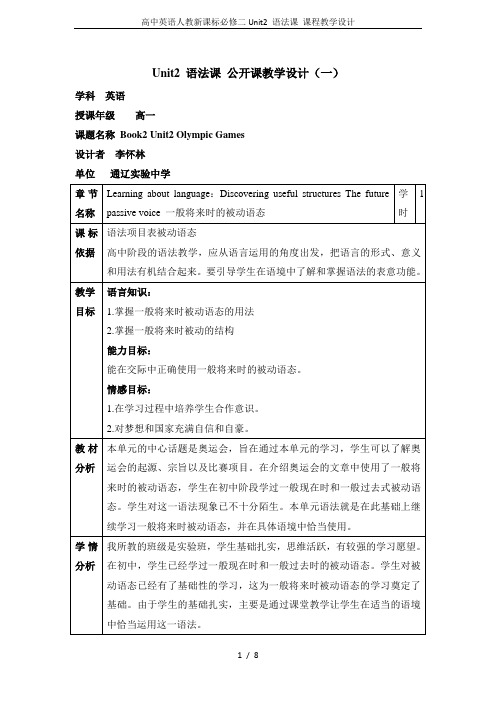
Unit2 语法课公开课教学设计(一)学科英语授课年级高一课题名称Book2 Unit2 Olympic Games设计者李怀林单位通辽实验中学附件:课堂练习III.Exercise1.Fill in the blanks with the correct form of the given words(1)A new poster ________ (design) next week in order to advertise the coming Olympics.(2)Liu Xiang ________(choose) for the Chinese team at the Athens Olympic Games and won a gold medal.(3)Tomorrow the two athletes _________ (send) to Australia for swimming training in preparation for the next Olympic Games.(4)Women __________(allow) to compete in the modern Olympic Games.(5)No smoking will be allowed in the stadium. If you __________(discover), you will be fined.2.Proof reading(1)Nobody will be allow to enter the stadium without a ticket.(2)Children will not allowed to make a noise and upset the competitors. If they do, they will be took away from the stadium.(3)Cheating by athletes will not be excused. They will be told to leave and will be punishing.3.Fill in the blanks with the correct form of the given words.A Bridge between The Ancient and The Modern Olympic GamesHello! I’m the torch that lights the Olympic fire and starts every modern Olympic Games.I always begin my journey from Olympia in Greece where the ancient Games _______ first ________(held). I ______ usually _________(light) by the sun there and _________(carry) by many runners from different countries. Many people come to watch as I travel through their countries to the host city. However, only the best athletes carry me! It’s a great honour and many athletes hope to get the chance to do so. The greatest honour is to be the last athlete who carries me into the stadium where the Games _____________(hold) . The last athlete gets the opportunity to light the Olympic fire. That fire will burn for the whole period of the Games and it______________( not put) out until the Games end. It is a wonderful experience to be a bridge between the ancient and Olympic Games. Long may the Olympics continue.4. Group work. Make up a dialogue in pairs.Situation: Your America friend, Mary , is visiting you. She is interested in the 24th wither Olympic Games and wants to know about the preparations(准备)for them. Make a dialogue to introduce our preparations for the Games in stadiums or gymnasiums, transportation and the promotion(推广)of the winter sports. 参考信息:(1)场馆建设(stadiums or gymnasiums):为了节约费用,2008年奥运会场馆将再次利用。
人教英语新课标必修2多媒体教案 unit2
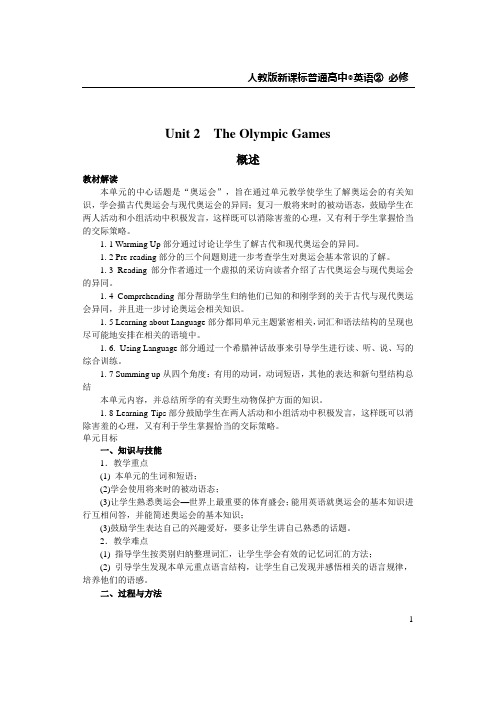
人教版新课标普通高中◎英语②必修Unit 2 The Olympic Games概述教材解读本单元的中心话题是“奥运会”,旨在通过单元教学使学生了解奥运会的有关知识,学会描古代奥运会与现代奥运会的异同;复习一般将来时的被动语态,鼓励学生在两人活动和小组活动中积极发言,这样既可以消除害羞的心理,又有利于学生掌握恰当的交际策略。
1.1 Warming Up部分通过讨论让学生了解古代和现代奥运会的异同。
1.2 Pre-reading部分的三个问题则进一步考查学生对奥运会基本常识的了解。
1.3 Reading部分作者通过一个虚拟的采访向读者介绍了古代奥运会与现代奥运会的异同。
1.4 Comprehending部分帮助学生归纳他们已知的和刚学到的关于古代与现代奥运会异同,并且进一步讨论奥运会相关知识。
1.5 Learning about Language部分都同单元主题紧密相关,词汇和语法结构的呈现也尽可能地安排在相关的语境中。
1.6. Using Language部分通过一个希腊神话故事来引导学生进行读、听、说、写的综合训练。
1.7 Summing up从四个角度:有用的动词,动词短语,其他的表达和新句型结构总结本单元内容,并总结所学的有关野生动物保护方面的知识。
1.8 Learning Tips部分鼓励学生在两人活动和小组活动中积极发言,这样既可以消除害羞的心理,又有利于学生掌握恰当的交际策略。
单元目标一、知识与技能1.教学重点(1) 本单元的生词和短语;(2)学会使用将来时的被动语态;(3)让学生熟悉奥运会—世界上最重要的体育盛会;能用英语就奥运会的基本知识进行互相问答,并能简述奥运会的基本知识;(3)鼓励学生表达自己的兴趣爱好,要多让学生讲自己熟悉的话题。
2.教学难点(1) 指导学生按类别归纳整理词汇,让学生学会有效的记忆词汇的方法;(2) 引导学生发现本单元重点语言结构,让学生自己发现并感悟相关的语言规律,培养他们的语感。
高中英语人教新课标必修二Unit2 语言点 课程教学设计
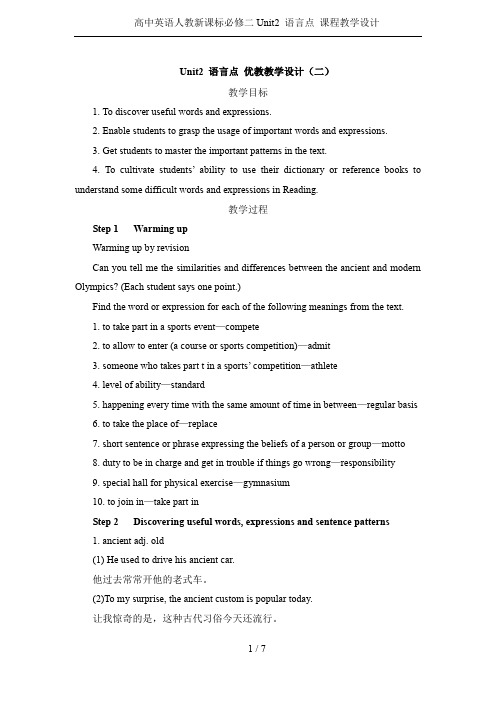
Unit2 语言点优教教学设计(二)教学目标1. To discover useful words and expressions.2. Enable students to grasp the usage of important words and expressions.3. Get students to master the important patterns in the text.4. To cultivate students’ability to use their dictionary or reference books to understand some difficult words and expressions in Reading.教学过程Step 1 Warming upWarming up by revisionCan you tell me the similarities and differences between the ancient and modern Olympics? (Each student says one point.)Find the word or expression for each of the following meanings from the text.1. to take part in a sports event—compete2. to allow to enter (a course or sports competition)—admit3. someone who takes part t in a sports’ competition—athlete4. level of ability—standard5. happening every time with the same amount of time in between—regular basis6. to take the place of—replace7. short sentence or phrase expressing the beliefs of a person or group—motto8. duty to be in charge and get in trouble if things go wrong—responsibility9. special hall for physical exercise—gymnasium10. to join in—take part inStep 2 Discovering useful words, expressions and sentence patterns1. ancient adj. old(1) He used to drive his ancient car.他过去常常开他的老式车。
高中英语人教新课标必修二unit2(2)Grammar学案设计

⾼中英语⼈教新课标必修⼆unit2(2)Grammar学案设计GRAMMAR⼀般将来时的被动语态【例句呈现】仔细阅读下列句⼦,注意观察它们的不同点。
1. We shall be asked to show the foreign friends around our school.2. Students will not be allowed to leave the school without their teacher’s permission.3. Will the plan be discussed at the meeting this afternoon?4. A new bridge is going to be built across the river to connect the two villages.5. Are these old trees going to be cut down?6. The form is to be filled in within two days.7. The young writer’s new book is not to be published this year.【归纳总结】1. 从以上例句中,我们可以看出⼀般将来时的被动语态的谓语主要有三种构成形式:①shall / will (shall只⽤于第⼀⼈称,will可⽤于所有⼈称) + be + 过去分词(见句1、句2和句3);②am / is / are going to + be + 过去分词(见句4和句5);③am / is / are + to + be + 过去分词(见句6和句7)。
2. ⼀般将来时的被动语态表⽰将要发⽣的被动动作,后常跟表⽰将来时间的时间状语。
3. ⼀般将来时的被动语态的否定形式是在shall / will, am / is / are后加not(见句2和句7);其疑问形式是将shall / will或am / is / are提前⾄句⾸(见句3和句5)。
高中英语人教新课标必修二Unit2_Reading 教学设计
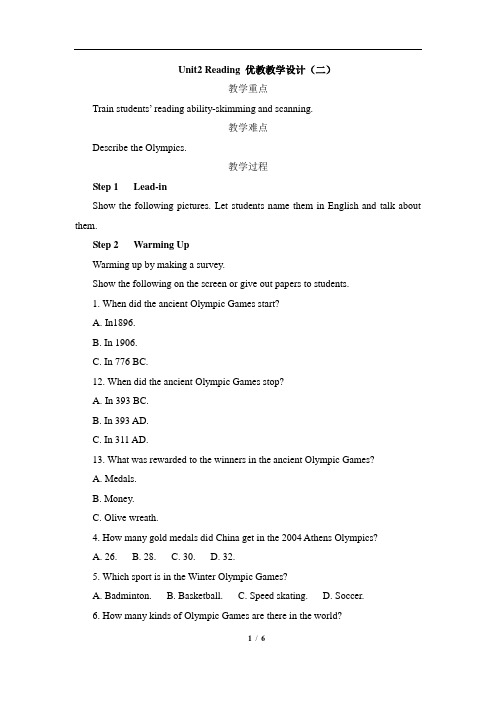
Unit2 Reading 优教教学设计(二)教学重点Train students’ reading ability-skimming and scanning.教学难点Describe the Olympics.教学过程Step 1 Lead-inShow the following pictures. Let students name them in English and talk about them.Step 2 Warming UpWarming up by making a survey.Show the following on the screen or give out papers to students.1. When did the ancient Olympic Games start?A. In1896.B. In 1906.C. In 776 BC.12. When did the ancient Olympic Games stop?A. In 393 BC.B. In 393 AD.C. In 311 AD.13. What was rewarded to the winners in the ancient Olympic Games?A. Medals.B. Money.C. Olive wreath.4. How many gold medals did China get in the 2004 Athens Olympics?A. 26.B. 28.C. 30.D. 32.5. Which sport is in the Winter Olympic Games?A. Badminton.B. Basketball.C. Speed skating.D. Soccer.6. How many kinds of Olympic Games are there in the world?7. What is the motto of the Olympic Games?8. What is the host city of the first Olympics?9. What is the host city of the 2004 Olympics?10. What is the host city of the 2008 Olympics?Suggested answers:1~5.CBCDC6. Two. They are the Summer Olympic Games and the Winter Olympic Games.7. Swifter, higher and stronger.8. Athens, Greece.9. Athens, Greece.10. Beijing, China.Step 3 Pre-reading1. Discussing and answeringAsk students to discuss and answer the questions:(l) Do you know any differences between the ancient and modern Olympic Games? List two of them.(2) When and where will the next Olympic Games be held?(3) Predict the content according to the title and the pictures.2. Looking and introducingAsk students to look at the three pictures and talk about them.For reference:The first picture is the status of a great Greek. His name is Pausanias. He was a famous traveler and writer in the second century AD.The second picture is a Chinese athlete named Yang Yang. She won a gold medal for China at the2002 Winter Olympic Games. She is a famous skating player.The third picture is the opening ceremony of the Olympic Games. Maybe this is the principle stadium. It’s large and can hold thousands of audience. .Step 4 Reading1. Skimming for the general ideaAsk students to read the passage fast and try to find the answer to the following question.What does the passage mainly tell about?Suggested answer:This passage mainly tells about the similarities and the differences between the ancient and modern Olympic Games.2. Scanning for detailed information(l)Ask students to read this passage carefully to locate detailed information and then choose the best answer.①Where do all the competitors live?A. In a hotel.B. In a special village.C. In a restaurant.D. In a place hired by competitors.②Why do so many countries want to host the Olympic Game?A. To run faster, jump higher and throw further.B. To get a great honour.C. To make the country famous.D. To make money.③Which of the following is included in the Winter Olympic Games?A. Skiing and ice skating.B. Running races.C. Horse riding.D. Swimming.④The 2004 0lympic Games were held in .A. BeijingB. AtlantaC. AthensD. Sydney⑤Why does Pausanias think people may be competing for money in the modern Olympic Games?A. Because the winner can get medals.B. Because the winner can be awarded lots of money by their own countries.C. Because the olive wreath has been replaced by medals.D. Because medals are made of gold.Suggested answers: ①~⑤BBACC(2)Ask students to work in pairs to fill in the table.3. Read aloud and underline expressions.Students read the text aloud and underline all the expressions in the text. Write them down after class as homework.Suggested answers:Collocations: take part in...; gold medal; the spirit of...; stand for; be held; on a magical journey; find out; the present-day Olympic Games; used to; write about...; come to your time; two sets of…; be admitted as...; enjoy competing in...; compete against...; for the honour of...; reach the standard; be admitted to...; play a very important role; stadiums for competitions; as well; host the Olympic Games; as amatter of fact; the olive wreath; compete for...4. Read, identify and settleStudents skim the text once more and identify the difficult sentences. Let them try analyzing the structures of the difficult sentences and discuss them among their group members,5. Discuss the writing styleLet students discuss the writing style of this passage and then fill in the chart.Suggested answers:Step 5 Interview activityAsk students to work in pairs. Suppose one is Li Yan and the other is Pausanias.1. Let students in pairs discuss. and prepare 3~5 questions to ask Pausanias. Tell them it will be better to have different questions from those in the text.2. Remind students that t good journalists know how to start an interview. For example, they usually introduce themselves or talk about something that the interviewees are interested in or familiar with.3. Students practice their interviews.4. Ask a few pairs of students to perform their interviews.(At the end of each presentation, ask students to clap their classmates. Do not interrupt the presenters or correct their errors while they are talking. Instead, make every effort to help them to complete the task when they have difficulty. Point out some common errors students have made after all the groups have finished their presentations.)Step 6 Closing down by summarizingAs we have finished the passage, we’ll sum up what we have learned. First let’s see the writing skills. It is written in a conversational style. It’s in a very interesting way. It adopts a dialogue between Pausanias who lived 2000 years ago and a Chinese girl in modern world. Through their dialogue, the differences and similarities between the ancient and modern Olympic Games are made known to the readers. Just because it is in a conversational style, there are quite a few oral spoken English and elliptical phrases.Through the comparison between the ancient and modern Olympic Games, we have learned the differences and the similarities between them. Now we can have a deep understanding of the Games. From the passage, we can also get to know that the Olympic Games are developing and improving. It’s our duty to make the Olympic Games better and healthier. We know that one of the slogans for 2008Beijing Olympic Games is Green Olympic Games. It shows that people are paying more and more attention to our environment.课后作业1. Learn all the useful new words and expressions in this part by heart.2. Read the passage An Interview again after class and finish Exercise 2 in Comprehending.。
人教新课标高中英语必修二Unit 2 The Olympic Games教案(1)

Unit2 The Olympic Games—Reading and ComprehendingTeaching DesignⅠTeaching aimsA.Knowledge aims1.Enable the students to learn and master:New words (e.g.: ancient, compete, volunteer).Phrases (e.g. take part in, stand for, be admitted to).Sentences (e.g. I lived in what you call “ancient Greece” and I used to write about the Olympic Games a long time ago)2. Enable students to learn the spirit of the Olympic Games and to grasp thedifferences between the old Greek Olympics and the modern Olympics.B. Ability aimsStudents are trained to improve their abilities of reading and speaking.C. Emotional aimsEnable students to learn some common sense of the Olympic Games, to learn about the spirit of Olympics—Swifter, Higher and Stronger so that students can cultivate the spirit of unity and cooperation and learn to strive hard to meet the future.Ⅱ Teaching important pointsEnable students learn some common sense of the Olympic Games, especially the difference between the ancient and modern Olympics.Ⅲ Teaching difficult pointsEnable students to grasp the article overall by skimming and to get some detailed information about ancient and modern Olympics by scanning.Ⅳ Teaching methodsTask-based approachCommunication approachⅤ Teaching aidsPPT computerⅥ. Teaching proceduresStep 1 Warming UpA. See a photo of Liu Huan and Sarah Brightman, then enjoy a song “You and Me”.B. Learn some Olympic Games in the 21th century by PPT and ask students, “What’sthe ancient Olympic Games like? Is it the same as the modern Olympic Games?”Step 2 ReadingA.Fast-readingTask1. Read the text quickly and answer the following questions.1. Who is Pausanias?2. Who is Li Yan?3. Why does Pausanias interview Li Yan?4. This interview is mainly about _____A. The story of a Greek writer Pausanias and a Chinese girl Li Yan.B. A major journey by Pausanias.C. The similarities and differences about the ancient and modern Olympics.D. The ancient Olympic Games in Greece.B.Careful-readingTask2. Read the text carefully and decide whether the statements are true or false and correct the wrong statements. (T or F)1. Only Greece could take part in the ancient Olympic Games.2. The summer Olympics are usually held two years before the winter Olympics.3. There are running races, ice skating in the winter Olympics.4. Women were not admitted to join in the old Olympics.5. There isn’t any place for athletes to live in.C.SummaryTask3. Read the text again and fill in the form to make a comparison between theStep 3 Post-readingDiscussionWho’s your favorite Olympic athlete? What can you learn from him or her? Step 4 Homework:1. Finish the exercise 1-3 on page 12.2. Finish the exercise C on page 35(导学案).。
新目标高中英语必修二Unit 2 The Olympic Games教学设计

Unit 2 The Olympic GamesUsing language---reading教学设计一、教材内容分析人教版第二单元这一课时由Using language部分中的reading部分引入,让学生了解希腊神话故事,并从中体会到运动的魅力,进而引导学生谈论自己最喜欢的运动。
学生通过自主的讨论,引起他们对运动感兴趣,使他们更关心国家举行的各种运动项目,从而使他们更关爱我们的国家和民族,也让他们在生活中形成热爱运动的习惯。
并且通过让学生写关于自己喜欢的运动的文章,以提高他们英语写作的水平。
二、学生分析1. 学生的英语基础水平很低,并且班级里学生英语基础参差不齐。
2. 通过前面几个课时的学习,学生对奥运会以及奥运会的运动项目有所了解,也知道讨论话题的方向。
3. 尽管已经进入到高中的学习了,但是学生们仍然不具备高中英语写作所具备的词汇量。
三、教学目标( Teaching Aims):1.Read the passage The Story of Atlanta, and know about the Greek mythology.2. To master the following expressions:Stand for;one after another; deserve;volunteer;regular3. To help the students learn how to describe their favorite sport.四、教学重点(Teaching Important Points):1.Get the Students to talk about their favorite sports.2.Enable the students to write a composition about their favorite sports.五、教学难点(Teaching Difficult Points):1. Help them understand and talk about the topic.2.Help them learn the method of reading.3. Help them write a composition.六、教学方法(Teaching Methods):1.Discussion in pairs and in groups of four.2.Practice to improve the students’ writing ability.七、教具(Teaching Aids):A multimedia computer.八、设计思想根据《高中英语教学大纲》的要求,在课堂教学中,必须以学生为主体,为中心进行教学,教师在教学中起主导作用。
- 1、下载文档前请自行甄别文档内容的完整性,平台不提供额外的编辑、内容补充、找答案等附加服务。
- 2、"仅部分预览"的文档,不可在线预览部分如存在完整性等问题,可反馈申请退款(可完整预览的文档不适用该条件!)。
- 3、如文档侵犯您的权益,请联系客服反馈,我们会尽快为您处理(人工客服工作时间:9:00-18:30)。
Unit 2 Cultural relics课文填空1. A cultural relic is something that has survived (survive) for a long time.2. It is your job to look into (调查) any reports of cultural relics that have been found (find) in China.3. You are sent to a small town where(引导词)you find a relic that was stolen (steal) from a palace.4. The man who has it insists that it belongs to (属于) his family。
5. Think of a cultural relic you know about. How would you feel if it got lost (lose).6. Although (连词) the amber feels as hard as stone, it easily melts when heated(heat)7. Once it is heated, the amber can be made into (做成)any shape.8. The design for the room was of (介词)the fancy style.9. In return (作为回报), the Czar gave the king of Prussia 55 of his best soldiers.10. About four metres long, the room served as (介词) a small reception room(接待室)for important visitors.11. Later, Catherine II had the Amber Room moved (move) to the palace outside St Petersburg where(引导词)she spent her summers.12. Almost six hundred candles lit (light) the room at that time.13.This was a time when(引导词)the two countries were at war (处于交战状态)。
14.But some of the Nazis secretly(秘密地)stole the Amber Room itself.15. In less than (不到,少于)two days, 100,000 pieces of the room were put inside twenty-seven wooden (木制的)boxes.16 She was at work(在工作)in the garden all this morning.17. Children who are at play (在玩)often make a lot of noise.18. When we called, the family were at dinner(在吃饭dinner)19. What are they doing now? They are at meal(在吃饭meal)20. The old man saw some Germans taking apart (拆开) the Amber Room and moving(移走)it away.21. The judge cares only whether the eyewitness has given useful information, which must be facts, ratherthan opinions.(而不是观点)22. A fact is anything that can be proved (prove).23. Of course, some people will never believe something is a fact even though (连词)they are given lots of evidence。
24..They think the men are not telling the truth. (说出事实).25. An opinion is what (引导词) someone believes is true but has not been proved.26. I think highly (副词)of those who are searching for the Amber Room。
27.Nor do (助动词) I think they should give it to any government.28. This blue and white vase, from the period of the Qing Dynasty belongs to(属于)a Hong Kong merchant. 29.There is no doubt (毫无疑问) that the search for those lost cultural relics will continue.30.She gave us food and clothes and asked for nothing in return(回报)。
31.Several years ago, however ,(副词) he put down his pen and began to protect cultural relics in Tianjin, where(引导词)he lives。
32.One of his biggest projects was to protect (protect) the oldest street in Tianjin.33.The old man said he would give it to his grandson, who had not yet been born.(出生)34. He knows the past is not only for us to enjoy but also (短语)for the children of the futureBook 2 Unit 1 Cultural Relics1. culture n.(1)[U] 文化,艺术eg. culture shock n.文化冲击(2)[C/U]文明eg. ancient Greek culture古希腊文明(3)修养,教养eg. a man of little culture没有教养的人(4)[U]栽培,养殖eg. bee-culture养蜂2. survive v.用法:(1)vt. 比……长寿“A survive B”eg. The man survived his sister by 3 years.这个人比他姐姐长寿三年。
(2)vt. 经历某事物幸存eg. survive the accident幸免于难eg. Few of the houses survived the war.没有几幢房子保留到战后(3)vi.继续生存或存在eg. Of the wounded, only three survived.伤员中只有3个人活了下来。
短语:survive from…从……留存下来eg. Many strange customs have survived from the earlier times.有许多古怪的习俗源远流长。
survive on靠……幸存下来eg. I can’t survive on 30 dollars a week.我没有30美圆难以活命。
派生词:survivor n.生还者,残存者eg. Send help to the survivors of the earthquake. 救助地震中的幸存者。
survival n.生存,幸存eg. survival of the fittest适者生存构词法:survive v.------survival n.refuse v.------refusal n.arrive v.-----arrival n.3. remain(1)vi.留下,剩下,遗留,逗留“remain + adj./ n./p.p/ to be done”eg. remain standing/ seated一直站着/ 坐着(2)link v.保持,依然eg. remain/ keep silent保持沉默eg. The situation remained unchanged.这种情形保持不变。
注意:remain作vi不能用被动语态表达:“……留下来被做”,而用:“ Sth. remains to be done.”eg. It remains to be seen (see) whether you are right 你是否正确,以后可见分晓。
eg. Much remains to be done (do)要做的事情还很多。
派生词:remaining adj剩下的(前置定语)------left adj.剩下的(后置定语)remains 古代遗迹,废墟remainder 剩余物,其他人员,剩余时间练习:1. The children remained still (保持安静)until after class.2. The lady said that she would buy a gift for her daughter with remaining 20 dollars.(剩下的20美元)区别:remain/ stay(1)表示其他人/物已离开原地,这时“留下来”用remaineg. Much remains to be done(2)表示“继续停留”“继续存在”时remain= stayeg. Country music today remains/stays much the same as before.eg. The window stayed /remained open all the night.这扇窗子整夜开着。
